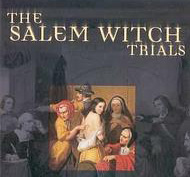The Witches of Salem
In 1692 a group of adolescent girls in Salem Village, Massachusetts, became subject to strange fits after hearing tales told by a West Indian slave. They accused several women of being witches. The townspeople were appalled but not surprised: Belief in witchcraft was widespread throughout 17th-century America and Europe. Town officials convened a court to hear the charges of witchcraft. Within a month, six women were convicted and hanged.
The hysteria grew, in large measure because the court permitted witnesses to testify that they had seen the accused as spirits or in visions. Such "spectral evidence" could neither be verified nor made subject to objective examination. By the fall of 1692, 20 victims, including several men, had been executed, and more than 100 others were in jail (where another five victims died) -- among them some of the town's most prominent citizens. When the charges threatened to spread beyond Salem, ministers throughout the colony called for an end to the trials. The governor of the colony agreed. Those still in jail were later acquitted or given reprieves.
Although an isolated incident, the Salem episode has long fascinated Americans. Most historians agree that Salem Village in 1692 experienced a kind of public hysteria, fueled by a genuine belief in the existence of witchcraft. While some of the girls may have been acting, many responsible adults became caught up in the frenzy as well.
Even more revealing is a closer analysis of the identities of the accused and the accusers. Salem Village, as much of colonial New England, was undergoing an economic and political transition from a largely agrarian, Puritan-dominated community to a more commercial, secular society. Many of the accusers were representatives of a traditional way of life tied to farming and the church, whereas a number of the accused witches were members of a rising commercial class of small shopkeepers and tradesmen. Salem's obscure struggle for social and political power between older traditional groups and a newer commercial class was one repeated in communities throughout American history. It took a bizarre and deadly detour when its citizens were swept up by the conviction that the devil was loose in their homes.
The Salem witch trials also serve as a dramatic parable of the deadly consequences of making sensational, but false, charges. Three hundred years later, we still call false accusations against a large number of people a "witch hunt." (Source: Outline of American History)
|
|

From the cover of the book "
The Salem Witch Trials: a day-by-day chronicle of a community under siege." By Roach, Marilynne. Taylor Trade Publishing, October 2004
The Puritans
It is likely that no other colonists in the history of the world were as intellectual as the Puritans. Between 1630 and 1690, there were as many university graduates in the northeastern section of the United States, known as New England, as in the mother country -- an astounding fact when one considers that most educated people of the time were aristocrats who were unwilling to risk their lives in wilderness conditions. The self-made and often self-educated Puritans were notable exceptions. They wanted education to understand and execute God's will as they established their colonies throughout New England.
The Puritan definition of good was that which brought home a full awareness of the importance of worshipping God and of the spiritual dangers that the soul faced on Earth.
Life was seen as a test; failure led to eternal damnation and hellfire, and success to heavenly bliss. This world was an arena of constant battle between the forces of God and the forces of Satan, a formidable enemy with many disguises. Many Puritans excitedly awaited the "millennium," when Jesus would return to Earth, end human misery, and inaugurate 1,000 years of peace and prosperity.
(Source: Outline of American Literature)
Arthur Miller: The Crucible
 
|


